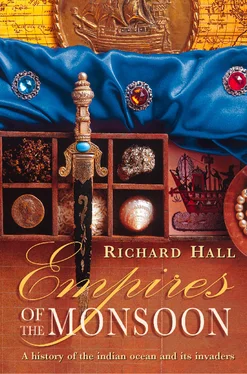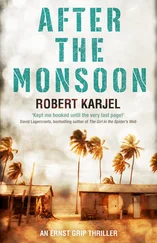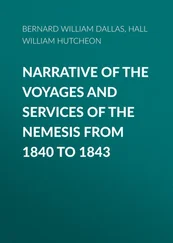Public delight with the first African giraffe ever seen in China was to prove stronger than the imperial desire to belittle it as a portent. Although, in these early years of the Ming dynasty, there was a widespread interest in natural science – the emperor’s own brother had written a serious work on botany – the people had long awaited a qilin , and the giraffe seemed as near to one as the animal kingdom was likely to provide. A member of the Imperial Academy called Shen Du caught the mood with his poem, which was prefaced by a flowery dedication to the emperor: ‘I, Your Servant, joining the throng, behold respectfully this omen of good fortune and kneeling down a hundred times and knocking my head on the ground I present a hymn of praise as follows.’ Amid a welter of rhetoric comes Shen Du’s highly fanciful description of the giraffe:
In a corner of the western seas, in the stagnant waters of a great morass,
Truly was produced a qilin whose shape was fifteen feet high,
With the body of a deer and the tail of an ox, and a fleshy boneless horn,
With luminous spots like a red cloud or a purple mist,
Its hoofs do not tread on living creatures.
This apparent harmlessness (although its hind legs do possess a lethal kick) was the characteristic the giraffe most visibly shared with that mythical unicorn. 2The admiring crowds had no fear as this latest gift from foreign lands walked through Beijing with its curious, camel-like stride. Its head, far above the admiring crowd, turned constantly from side to side as it sniffed the autumn air. In the words of Shen Du: ‘Ministers and people gathering to behold it vie in being the first to see the joyful spectacle.’ Another courtier wrote in a similar vein: ‘Its two eyes rove incessantly. All are delighted with it.’ The creature was strange in so many ways: despite having a tongue nearly as long as a man’s arm, it could not utter the faintest sound. A Chinese painting survives in which the animal is being led on a rein by the Bengali keeper who has accompanied it across the seas; he looks up devotedly at his charge. 3
So when yet another tame giraffe appeared, directly from Malindi, in the following year – the precise date, 10 October 1415, can be calculated from Chinese records – the emperor had to yield to the enthusiasm of the populace. He went himself to welcome it. Two other most auspicious creatures were being led towards him behind the chestnut-coloured giraffe: a ‘celestial horse’, a zebra, and a ‘celestial stag’, an oryx. This time the emperor’s pronouncement was less dismissive, but suitably modest. He attributed this symbol of harmony and peace to ‘the abundant virtue of the late emperor, my father’, enhanced by the support of his own ministers. From now on, it would be his duty to hold ever more resolutely to virtue, and the duty of his ministers to remind him of any shortcomings.
A certain testiness can be discerned in the emperor’s comments on the excitement aroused by Malindi’s giraffes. After all, the transporting of gifts was only incidental to the intensely serious business of the great expeditions. The giraffes are not even mentioned by Ma Huan, a chronicler who went with Zheng He on several voyages. Ma Huan was intent on describing the countries he visited, and without his book, Yingyai Shenglan (Triumphant Visions of the Ocean’s Shores ,, the reputation of his master would rest only upon fragmentary writings.
Ma Huan was also a Muslim, his surname being the same as the one Zheng had originally possessed, although he is not known to have been a eunuch. He was recruited at a time when Zheng was coming to realize that the further he sailed the harder it would be to understand the languages of the barbarian envoys brought back to the imperial court. (Sometimes it was proving necessary to resort to ‘double translation’, in which the envoys’ messages were relayed through two interpreters before a Chinese version could be conveyed to the emperor.) Zheng had already set up a foreign languages school in Nanjing, and Ma Huan was one of a corps of seagoing interpreters whose first duty was to be in attendance when audiences were held with foreign monarchs. The interpreters would also help the Chinese merchants accompanying Zheng’s fleets.
In personal references in his book, Ma is self-deprecatory in the typical Chinese style of the time. He calls himself a ‘simpleton’ and a ‘mountain-woodcutter’, for whom the expeditions were ‘a wonderful opportunity, happening once in a thousand years’. Nevertheless, Ma was well educated, with a mastery of written and spoken Arabic. His book begins with a laudatory poem, with these opening lines:
The Emperor’s glorious envoy received the divine commands,
‘Proclaim abroad the silken sounds, and go to the barbarous lands’.
His giant ship on the roaring waves of the boundless ocean rode,
Afar, o’er the rolling billows vast and limitless, it strode.
The poem goes on to list some of the twenty countries he saw on the expeditions, and declares that the foreign peoples were ‘grateful, admiring our virtue, showing themselves loyal and sincere’. He says proudly that merchants from the ‘Central Glorious Country’ were now travelling as far as Misr (Egypt).
Measured by the information his book gives on social customs, trade and current affairs, Ma is on a par with Marco Polo and Ibn Battuta. Since less than a century separates them, it is especially rewarding to set Ma’s accounts of the Indian Ocean alongside those of Ibn Battuta. For example, both exerted their descriptive talents in praising Calicut and its people.
By the time Ma came to Calicut in 1414, the port had grown to become a city-state, and with some hyperbole he called it ‘the great country of the Western Ocean’. Almost a tenth of his entire book is devoted to Calicut, which the grand eunuchs leading the expeditionary fleets used as the pivot of their operations. One reason for Ma’s praise for Calicut (apart from an eagerness to mirror the judgement of his superiors) was the strong Islamic leanings of a town which had more than twenty mosques and a settled Muslim population of 30,000. Everywhere in its streets Arabic could be heard. To a young Chinese Muslim, one of whose main goals in life was to make a pilgrimage to Mecca, Calicut’s atmosphere must have been exhilarating. Arabia was just across the ocean, no more than a fortnight’s voyage away with a fair wind.
It may have been a desire to please Chinese readers that led Ma to assert that the Zamorin, the Sea-King of Calicut, was a Buddhist. In fact he was a Hindu. But the ‘great chiefs’ who advised the ruler were all Muslims, and the two most senior had been given high awards by Zheng He on the emperor’s orders. The envoys of Calicut were granted precedence over all others when they went to China to present tribute. Ma applies a string of laudatory epithets to the people of the city: honest, trustworthy, smart, fine and distinguished. He gives a detailed picture of the way trade was conducted between the representatives from a Chinese ‘treasure ship’, bringing ashore their silks, porcelains and other goods, and the local merchants and brokers. It was a slow process, taking up to three months, for prices had to be agreed separately, but eventually all parties would clasp hands and swear that the settlement would never be repudiated. The presence of ‘His Excellency the Eunuch’ at the hand-clasping ceremony confirms the importance attached to trade on the expeditions, notwithstanding all the grandiose rhetoric about their civilizing role.
It intrigued Ma – he calls it ‘very extraordinary’ – that the merchants of Calicut did not use an abacus in the Chinese fashion when making calculations: ‘They use only their hands and feet and the twenty digits on them, and they do not make the slightest mistake.’
Читать дальше












